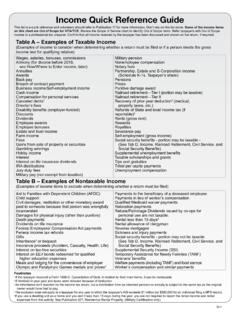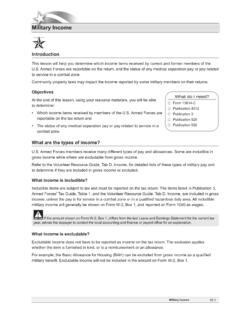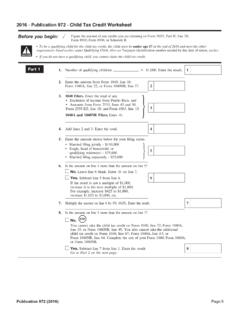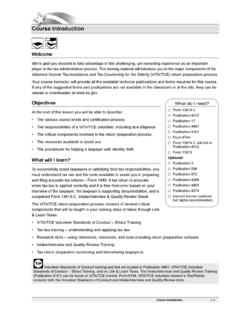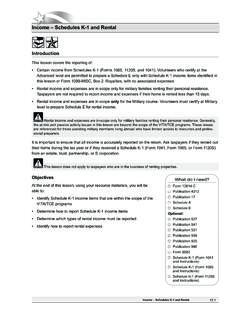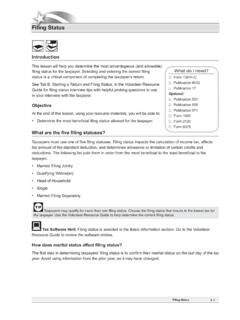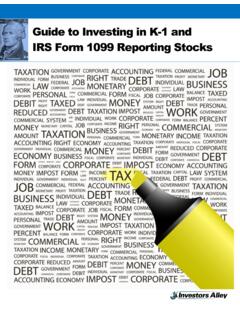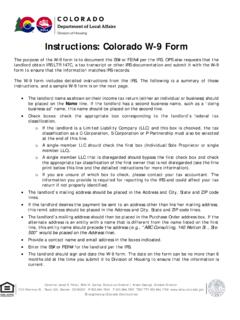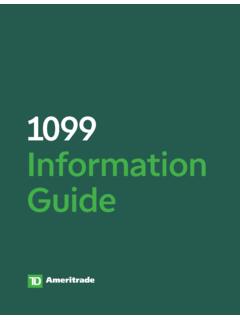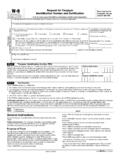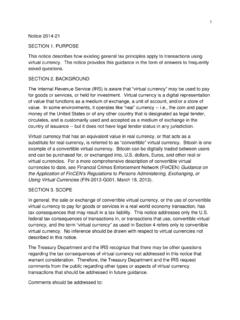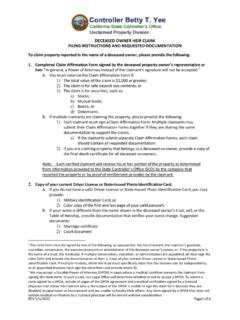Transcription of Income – Capital Gain or Loss - IRS tax forms
1 Income Capital Gain or Loss10-1 IntroductionThis lesson will help you assist taxpayers who must use form 8949, Sales and Other Dispositions of Capital Assets, in conjunction with form 1040, Schedule D, Capital Gains and Losses, to report Capital gains and/or losses on the sale of assets. This lesson includes topics on the sale of stock, mutual funds, and the sale of a personal residence. If the taxpayers have sold any other assets, refer them to a professional tax preparer. This lesson will help you identify the asset s holding period, adjusted basis, net short-term and long-term Capital gains or losses, the taxable gain or deductible loss, the tax liability, and the amount of any Capital loss carryover. The intake and interview sheet asks about Income from the sale of property such as stock, bonds, virtual currency, or real estate.
2 Ask taxpayers if they sold any stock, securities, other investment property, or a home during the tax year. It is important to ensure that all Income is accurately reported on the Capital Gain or Loss Transactions using a virtual currency or buying and selling a virtual currency are out of additional information on the topics discussed in this lesson, see Publication 544, Sales and Other Dispositions of Assets, Publication 551, Basis of Assets, Publication 550, Investment Income and Expenses, and Publication 523, Selling Your the end of this lesson, using your resource materials, you will be able to: Determine the adjusted basis of Capital assets Determine if the asset s holding period is long-term or short-term Calculate the taxable gain or deductible loss from the sale of Capital assets Determine whether a home is the taxpayer s main home Determine if a taxpayer meets the ownership and use tests Determine when the 5-year ownership/use test period is suspended What do I need?
3 form 13614-C Publication 4012 Publication 17 Optional: Publication 523 Publication 544 Publication 550 Publication 551 form 1040 Instructions form 1040, Schedule D and Instructions form 1099-B form 1099-DIV form 1099-S form 8949 Income Capital Gain or Loss10-2 What information must I have to report a Capital gain or loss?To report Capital gain or loss, you will need to identify: Basis and/or Adjusted Basis: Basis is the original cost of the asset Adjusted basis includes original cost plus any increases or decreases to that cost (such as commissions, fees, depreciation, deductible casualty losses, insurance reimbursements or major improvements) Brokers must report cost or other basis on form 1099-B, unless the securities sold were noncovered securities Taxpayers must use codes to report if form 1099-B was received and whether or not it showed basis reported to the IRS Holding period.
4 Short-term property is held one year or less Long-term property is held more than one year Long-term Capital gains are taxed at a lower rate than short-term gains Brokers must report whether the gain or loss is short-term or long-term on form 1099-B, unless the securities sold were noncovered securities Proceeds from the sale: form 1099-B reflects gross or net proceeds for a stock or mutual fund form 1099-S usually reflects gross proceeds of real estate transactions Other evidence in the absence of the above Tax Software Hint: To review information related to the software, go to the Volunteer Resource guide , Tab D, Income , Schedule D, Capital Gain or is the basis of stock? BasisIn order to compute gain or loss on a sale, taxpayers must provide their basis in the sold property. The basis of property is usually its cost.
5 If taxpayers need help determining their basis and do not have the original purchase documents, refer them to Publication 551 and their stockbroker. If taxpayers cannot provide their basis in the property, the IRS will deem it to be zero. Special rules apply to inherited property; these rules are covered in this lesson in the topic, Basis Other Than Cost. If the taxpayer acquired the stock by means other than a purchase or inheritance, such as a gift or an employee stock option plan (ESOP), and does not know the basis of the stock, refer them to a professional tax preparer. The determination of basis in these situations is beyond the scope of the VITA/TCE programs. Income Capital Gain or Loss10-3 Adjusted BasisAn adjustment to basis may include additional commissions or fees paid to the broker at the time of purchase or sale.
6 Stock is bought and sold in various quantities. It is important for the taxpayer to keep track of the basis per share of all stock bought and sold. Events that occur after the purchase of the stock can require adjustments (increases or decreases) to the per share basis of stock. The original basis per share can be changed by events such as stock dividends and stock splits. Stock dividends are issued in lieu of cash dividends. These additional shares increase the taxpayer s ownership (number of shares). The adjusted basis of the original stock shares is split among the new total of shares, including the new stocks issued as a dividend. This lowers the taxpayer s basis per share. A stock split is a method used by corporations to lower the market price of stock. A two for one stock split will decrease the basis per share by half.
7 For example, the original basis of $200 for 100 shares becomes $200 for 200 shares. DRIP (dividend reinvestment plan) accounts leave cash dividends with the company for the purchase of additional shares. Even though these shares are from the same company, they retain their own individual basis separate from the original purchase. Each new purchased share could have a different or mutual fund companies will track the basis of mutual fund shares for covered securities. Still, taxpayers should keep track of their basis in mutual fund shares. The original basis of mutual fund shares bought is usually their cost or purchase price. The purchase price usually includes any commissions or load charges paid for the purchase. The cost basis of mutual fund shares acquired by reinvesting distributions is the amount of the distributions used to purchase each full or fractional share.
8 This rule applies even if the distribution was an exempt-interest dividend that was not reported as Income . The basis in mutual fund shares may need to be increased or reduced. For more information, refer to Publication paid $1,100 for 100 shares of ABC, Inc. stock (which included the broker s commission of $25). The original basis per share was $11 ($1,100 100). She received 10 additional shares as a tax-free stock dividend. Her $1,100 basis must be allocated to the 110 shares (100 original shares plus the 10-share stock dividend). This results in an adjusted basis of $10 per share ($1,100 110).Basis Other than CostThere are times when cost alone cannot be used as basis. In some cases, the fair market value (FMV) or adjusted basis is used. Property Received as a Gift To determine the basis of property received as a gift, taxpayers must know its adjusted basis to the donor just before it was given to the taxpayer.
9 Taxpayers also need to know the FMV at the time of the donation and the amount of any gift tax paid on the donation. Determination of the adjusted basis of property received as a gift can be very complex and is beyond the scope of the VITA/TCE programs. Inherited Property Before 2010 and after 2010: the basis of property inherited during this time is generally the FMV of the property on the date of the decedent s death. However, this can vary if the personal representative of the estate elects to use an alternate valuation date or other acceptable method. If the taxpayer cannot provide the basis for the property, refer the taxpayer to a professional tax Capital Gain or Loss10-4 During 2010 (after December 31, 2009, and before January 1, 2011): special rules may apply to property inherited from a decedent who died in 2010.
10 Determining the basis of such property can be complex. If the taxpayer cannot provide the basis for the property, refer the taxpayer to a professional tax preparer for determination of basis issues. For more information on the special rules, search for the historical Publication 4895, Tax Treatment of a Property Acquired from a Decedent Dying in 2010 (Rev. October 2011) under Prior Year forms and Instructions on Wash Sales The reporting of wash sales is in scope only if reported on form 1099-B (Boxes 1f and 1g) or on a brokerage or mutual fund statement. A wash sale is the sale of securities at a loss and the acquisition of the same (substantially identical) securities within 30 days of the sale date (before or after). Taxpayers cannot deduct losses from sales or trades of stock or securities in a wash sale unless the loss was incurred in the ordinary course of business as a dealer in stock or securities.
